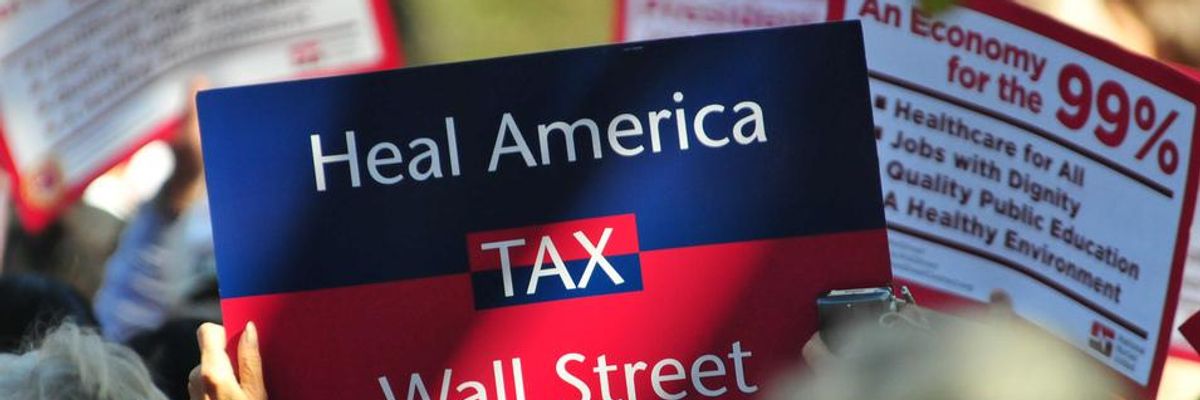Democrats on Tuesday proposed a tax on Wall Street transactions which could stop another financial crash and bring in $777 billion over the next decade.
"The Wall Street Tax Act would tax the sale of stocks, bonds, and derivatives at 0.1 percent," said Sen. Brian Schatz (D-Hi.), who introduced the bill (pdf) with U.S. Senator Chris Van Hollen (D-Md.) as lead co-sponsor.
"A stock trade of $1,000 would incur a tax of just one dollar," Schatz added.
The bill was also cosponsored in the Senate by Sen. Kirsten Gillibrand (D-N.Y.), who is seeking the Democratic nomination for president, and Sen. Jeff Merkeley (D-Ore.), who is not.
The House version of the bill was introduced by U.S. Representative Peter DeFazio (D-Ore.) with the support of Representatives Rosa DeLauro (D-Conn.), Raul Grijalva (D-Ariz.), Pramila Jayapal (D-Wash.), Ro Khanna (D-Calif.), Grace Napolitano (D-Calif.), Alexandria Ocasio-Cortez (D-N.Y.), Chellie Pingree (D-Maine), Mark Pocan (D-Wis.), Jan Schakowsky (D-Ill.), and Peter Welch (D-Vt.).
In an opinion piece published Tuesday, Sarah Anderson, the director of the Global Economy Project of the Institute for Policy Studies, said the tax was needed for market stability. Citing the use of high frequency trades by "stock scalpers"--traders who, millions of times a day, use microsecond advantages to drive up stock prices in advance of trades--Anderson argued that the tax could stop those traders from fleeing a volatile market in the case of a downturn; an acceleration of financial disaster known as a "flash crash."
"Even a tiny levy on each trade of stocks, bonds, and derivatives would deliver a heavy blow to high frequency traders, which make huge profits, but on slim margins per trade," wrote Anderson. "For ordinary investors whose portfolios have low turnover rates, the cost would be negligible--like a tiny insurance fee against future crises."
Economist Dean Baker, in a statement from the the Center for Economic and Policy Research (CEPR), concurred.
"At a time when members of Congress are exploring ways to tax the wealthy and fight income and wealth inequality," said Baker, "a financial transactions tax that discourages pointless trading [and] is targeted at the financial industry and frees up resources for other spending, is a welcome policy tool."
On business network CNBC's "Squawk Box"program Tuesday, economist Jared Bernstein called the tax a "progressive revenue raiser."
Anderson put the bill into historical context.
"In a rational political world, Congress would've adopted this type of tax immediately after the 2008 crash, while the wounds of a financial system run amok were fresher and deeper than today," Anderson said.
That doesn't mean the bill is dead on arrival, she added:
"In the current moment of surging support for taxing the wealthy, this sensible Wall Street tax may have a good shot."

